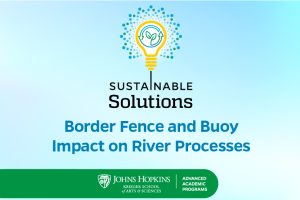Sustainable Solutions Presents: Border Fence and Buoy Impact on River Processes
Event Actions
Join us as we sit down with Dr. Adriana Martinez as she shares with us her research on the Rio Grande Border Militarization: and Assessing Border Fence and Buoy Impact on River Processes at Eagle Pass, Texas.

During this time Dr. Martinez will share with us results from her hydrologic study focusing on spatial modeling to examine the impacts of these fence sections on flood regimes at Eagle Pass, TX. Dr. Martinez will give a presentation of her work which will be followed by a question-and-answer session hosted by Dr. Rachel Isaacs, Environmental Sciences and Policy Program Coordinator.
Presenter Bio
Dr. Adriana Martinez is a Professor at Southern Illinois University Edwardsville with a joint appointment in the Department of Geography & GIS and the Department of Environmental Science. She received her bachelor’s degree in environmental Geosciences and Masters in Geography with a specialty in fluvial geomorphology from Texas A&M University and a PhD in Geography from the University of Oregon. She studies human impacts on rivers in addition to her efforts to increase diversity and inclusion in STEM disciplines. She previously served as an AGU Landing Academy national fellow aiming to increase the recruitment and retention of faculty and staff of color. Dr. Martinez is also on the board of the national American Association of Geographers, serves on the association’s JEDI committee, and has led and co-led multiple grants to increase diversity in the geosciences. Her work in geography delves into the branches of physical, human, and technical with her use of modeling, GIS, and drones in her research. Her current work examines the impacts of the U.S.-Mexico border fence on the Rio Grande River. Dr. Martinez has been interviewed by numerous outlets such as Scientific American, the BBC, CNN, and Spectrum News on her work on the border.
Sustainable Solutions Series Overview
The Sustainable Solutions Speaker Series is presented by the Environmental Sciences and Policy and the Energy Policy and Climate programs at Johns Hopkins University. Each talk features scholars and practitioners working to tackle ‘wicked’ environmental, energy, and climate problems. Speakers take us through how they leverage technology, policy, the private sector, markets, research, and field work to form innovative and lasting solutions. From water insecurity to climate adaptation, natural resource conflict to energy transitions, and food insecurity to sustainable agriculture, this series features the depth and breadth of Johns Hopkins University faculty and our greater community as we work toward a sustainable future.